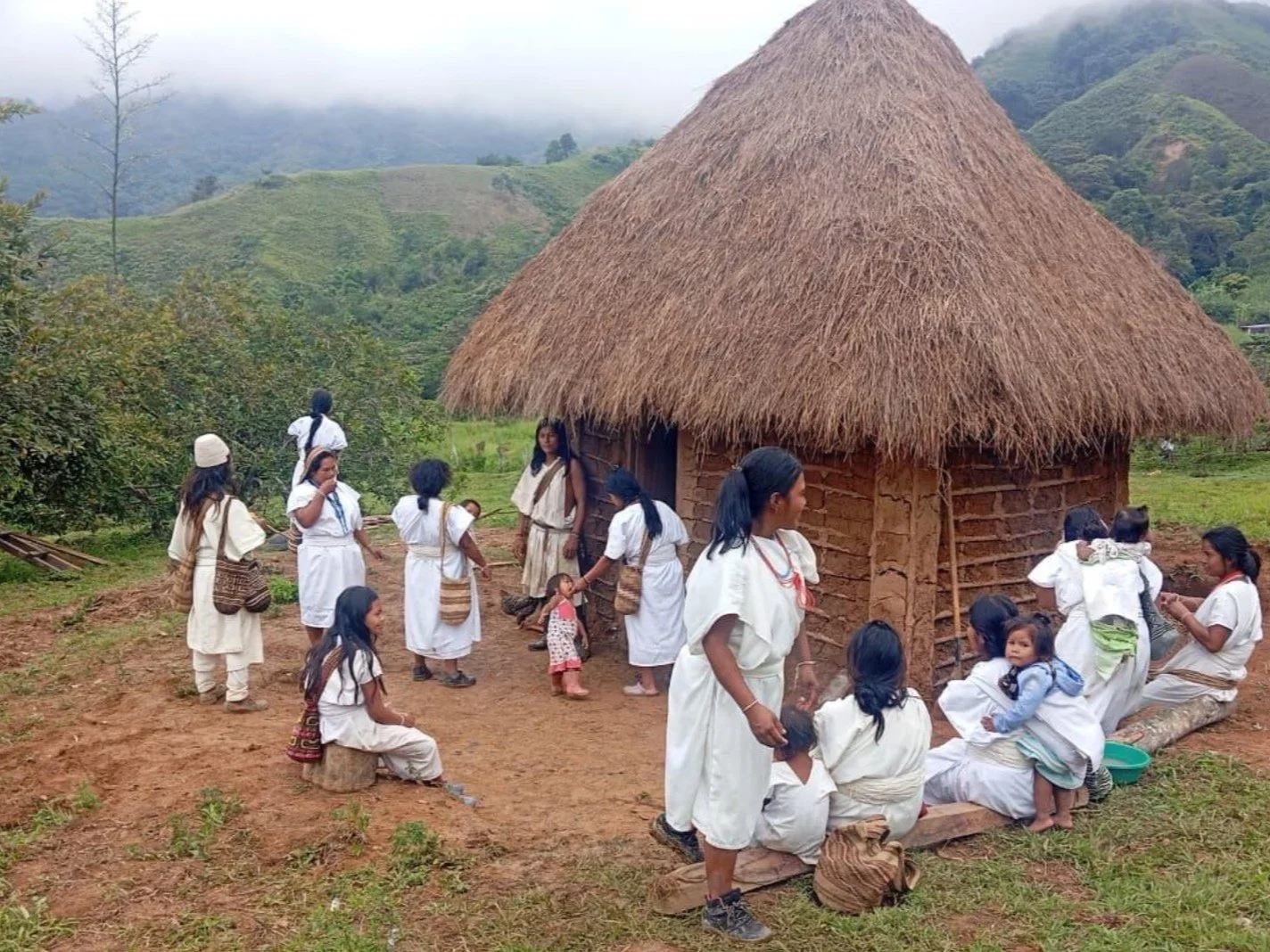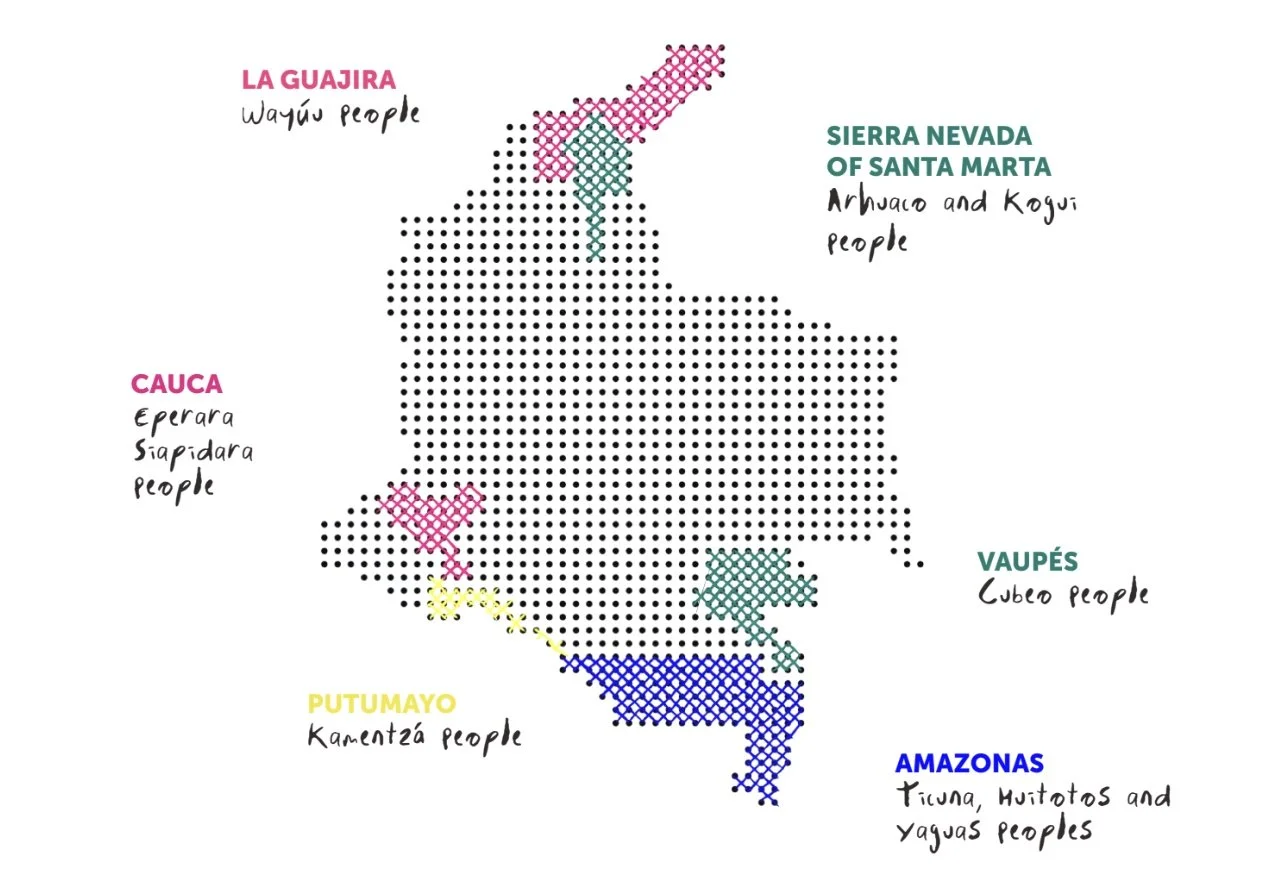Delzur: Weaving a Tapestry of Cultural Reverence and Ecological Harmony
This article first appeared August 6 in Impact Entrepreneur Magazine.
As part of a series of “fireside chats” sponsored by R.I.S.E. Artisan Fund, Emilia Torres shared her vision as CEO and founder of Delzur.
Since 2015, Emilia Torres and her team at the Hilo Sagrado Foundation have demonstrated ingenuity and resilience in their mission to improve the quality of life for Indigenous women in rural Colombia. Hilo Sagrado, or “Sacred Thread,” works with Wayuu communities in La Guajira peninsula – a desert region in northeastern Colombia – to provide Wayuu women with the tools to gain economic independence and escape poverty.
Hilo Sagrado provides Wayuu women with the tools to gain economic independence and escape poverty. © 2025 Hilo Sagrado
In June 2024, following nearly a decade as CEO of Hilo Sagrado, Emilia launched Delzur to expand the foundation’s impact through a for-profit social enterprise. Delzur creates new economic opportunities for Indigenous artisans while honoring their cultures and territories. The enterprise currently collaborates with seven Indigenous communities across six regions in Colombia: Arhuaco and Kogui in Tierra Nevada, Cubeo in Vaupés, Tikuna in Amazonas, Kamentsá in Putumayo, Epiara Siapidara in Cauca, and Wayuu in La Guajira.
“Artisans are much more than skilled workers; they are cultural guardians whose work embodies ancestral wisdom, lived experience, and an unwavering commitment to tradition. Every handcrafted piece represents an invaluable cultural legacy that reflects their community’s heritage and relationship with the natural world,” Emilia shared. “Recognizing their craft means ensuring artisans receive the respect, resources, and acknowledgment their work deserves.”
Delzur works with more than 220 Indigenous artisans—90% of whom are women. While Hilo Sagrado focuses on skill development and business education, Delzur connects these artisans with global markets. The products—unified by traditional crochet techniques and distinguished by regional ancestral patterns—include accessories and home goods that reflect the artisans’ deep connection to nature and cultural heritage. Each bag features the signature of its maker on the bottom—a symbol of artistic intention and pride.
Delzur connects indigenous artisans with a global market. The products are united in their use of traditional crochet techniques, and unique in the ancestral patterns that vary by region. © 2025 Delzur
Indigenous peoples in South America have long histories of sustainable land and resource stewardship. In Colombia, 35% of national territory is titled to and governed by Indigenous and Afro-Colombian communities—including 50% of the country’s remaining forests. Yet this ancestral wisdom and traditional way of life are increasingly threatened by both natural and man-made forces. Climate change has led to more frequent flooding, droughts, and ecological shifts, while extractive industries like mining continue to encroach upon Indigenous lands and threaten vital ecosystems. Despite their role in protecting these resources, many communities have been excluded from the economic growth Colombia has experienced over the past two decades.
Emilia and the Delzur team are working to ensure that Indigenous communities benefit economically from their stewardship. Delzur’s goal is to connect customers with the people and ecosystems behind each product. The ancestral motifs in every piece reflect each community’s local ecology and worldview.
The artisans’ patterns also reflect their present-day experiences and priorities. For many, defending their territories from external pressures is a daily concern. The rivers and mountains they fight to protect are woven into every bag.
“Our job is to be a connector—to highlight the importance of Indigenous people, their culture, and their territories,” Emilia explained. “We are so inspired by these communities, and we believe we can all learn from them. For them, we are not separate from nature. We are nature. So if nature is good, we are good. If nature is not good, we are not good.”
Hilo Sagrado continues to support Delzur’s artisans with holistic skill-building in areas such as sewing, green construction, entrepreneurship, design, and financial management. This integrated approach has led to improved product quality and increased economic autonomy, with some artisans’ incomes rising by as much as 600%.
“What we feel is important is that we all work together toward the same mission and vision: protecting these territories, giving a voice to Indigenous people, and bringing them into the market, into the conversation, and into our collective narrative,” emphasized Emilia.
The trusted relationships Emilia cultivated during her leadership at Hilo Sagrado laid the groundwork for Delzur. Most Indigenous territories are closed to outsiders without invitation, so community trust has been vital. This trust has led artisans to invite others to join Delzur through word of mouth. The same authenticity has also underpinned Delzur’s partnerships with government agencies, national parks, and corporations. At every stage, Emilia has been intentional about ensuring that these collaborations align with Delzur’s mission and benefit the communities involved.
As more consumers seek ethically made and culturally meaningful products, Delzur offers a direct connection to the communities behind its collections. Each item supports the traditions, autonomy, and livelihoods of Indigenous artisans.
In 2024, Delzur received a grant from R.I.S.E. Artisan Fund to help lay the foundation for the enterprise’s international launch. Their first collection debuted at the Global Artisan Project at Shoppe Object in February 2025 – a significant step in Delzur’s expansion into the US and international markets.
Emilia has witnessed the profound personal impact of this work on the artisans. “[Delzur] gives the women a voice—an opportunity to have their work recognized. For them, seeing their pieces in New York is amazing. ‘My bag, which I made in my house, is now in this beautiful picture.’ For them, it’s about pride—pride in their culture, their identity, and their world. There is so much dignity in that.”
Impact Opportunities
To learn more about these impact opportunities:
The R.I.S.E. Artisan Fund invests in early-stage artisan enterprises creating sustainable livelihoods for rural communities with few economic alternatives.
To invest via the R.I.S.E. Artisan Fund, you can make a tax-deductible contribution directly or via a grant from your donor advised fund (DAF). You can also co-invest directly in select investment opportunities. Contact ellen@sproutenterprise.net for more information or click here to invest in the fund.






